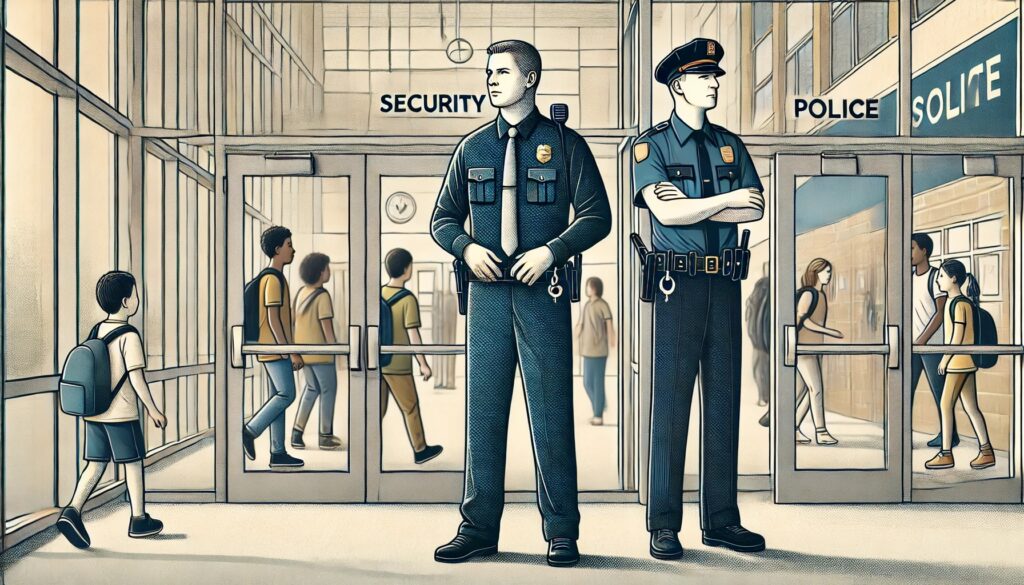
When it comes to protecting a school campus, both security guards and police officers play critical roles—but their training, focus, and responsibilities differ significantly. Schools often assume that having a police officer stationed at the front or available for emergency response is enough to ensure security. While law enforcement officers are highly skilled professionals, they are generalists trained to handle a wide range of public safety issues, from traffic stops to criminal investigations.
A well-trained school security guard, on the other hand, is a specialist—focused exclusively on securing school grounds, controlling access, and preventing threats before they escalate.
In this post, we’ll break down the differences between a police officer and a school security guard, explain why both are valuable, and highlight the unique role that dedicated, well-trained security guards play in achieving Gold Standard Security in schools.
The Core Difference: Defense vs. Response
The key distinction between a school security guard and a police officer comes down to mission and training focus:
✅ A well-trained security guard is trained to repel and defend.
Their primary responsibility is to prevent threats from entering the school in the first place by controlling access, monitoring behavior, and actively engaging potential threats. Security officers specialize in:
• Access control – Ensuring only authorized individuals enter the campus.
• Threat detection – Identifying suspicious behavior before an incident occurs.
• Defensive positioning – Maintaining a visible deterrent at entry points.
• Immediate engagement – Reacting to threats at the first point of contact to stop an attack before it escalates.
✅ A police officer is trained to respond and protect.
While law enforcement officers can absolutely serve as defenders, their primary training focuses on reacting to incidents, enforcing laws, and making arrests. Their expertise includes:
• Investigating crimes that have already occurred.
• Making arrests and enforcing the law.
• Handling active threats and coordinating emergency responses.
• Providing law enforcement authority for legal matters beyond school security.
Both roles are essential—but they serve different purposes in school security.
Why Schools Need Security Guards as Specialists
Police officers are highly trained professionals, but they must be generalists—they handle everything from criminal investigations to patrol duties across an entire jurisdiction. Because of this, a school security officer is often a better choice for proactive campus safety since their entire focus is school security.
A dedicated school security guard is:
✔ Fully focused on keeping threats out. Unlike police officers, who must be ready for any kind of crime in the community, a school security guard’s sole job is to protect students, staff, and school property.
✔ Trained to enforce school policies. A security guard ensures compliance with visitor management, access control, and safety protocols every single day.
✔ A direct point of contact for students and staff. Guards develop relationships with the school community, building trust while maintaining vigilance.
✔ A fast, immediate responder to threats. Guards don’t wait for backup—they are trained to engage and neutralize threats at the first sign of danger.
✅ Does this mean police officers shouldn’t be involved in school security?
Not at all! The best school security model includes both police officers and trained security personnel. A police officer’s law enforcement authority and investigative experience are incredibly valuable, but they should be a complement—not a replacement—for a dedicated security presence.
Gold Standard Security: How Security Guards and Police Officers Work Together
The strongest school security programs don’t force a choice between security officers and police. Instead, they create a layered security model where both professionals work together:
✔ Security Guards: Experts in school-specific defense, prevention, access control, and early threat detection.
✔ Police Officers: Experts in criminal investigations, response to major incidents, and law enforcement authority.
When these two roles are combined strategically, schools maximize both prevention and response capabilities.
How Schools Can Build the Best Security Team
To ensure a balanced, effective approach to safety, schools should:
🔹 Employ well-trained security guards who specialize in school defense, threat deterrence, and access control.
🔹 Develop a strong working relationship with local police so law enforcement is available when needed but not relied upon as the primary security presence.
🔹 Train both security guards and school staff in emergency response, situational awareness, and threat prevention.
🔹 Use integrated security technology to support both security personnel and police response efforts.
✅ Gold Standard Security isn’t just about reacting—it’s about preventing threats before they reach students.
Final Thoughts: Security Is Strongest When Roles Are Clear
Security guards and police officers each bring unique strengths to school safety. Both roles are necessary, but they must be used strategically.
A school security guard is a proactive defender, keeping threats out, maintaining school policies, and acting as the first line of defense.
A police officer is a reactive protector, handling legal enforcement, responding to incidents, and investigating crimes after they occur.
When used together, schools create a Gold Standard Security model—one that doesn’t just respond to danger, but actively prevents it.
Next Steps for School Security Leaders
🔹 Evaluate your current security approach. Does your school rely too heavily on law enforcement?
🔹 Invest in dedicated, well-trained school security officers. Ensure they have the skills and tools to be true defenders.
🔹 Strengthen your relationship with local police. Work together to ensure a clear division of responsibilities.
🔹 Prioritize prevention. The best security programs focus on keeping threats out—not just responding after an incident occurs.
By building a layered security model with dedicated security guards and law enforcement support, schools can proactively protect students and staff from harm.